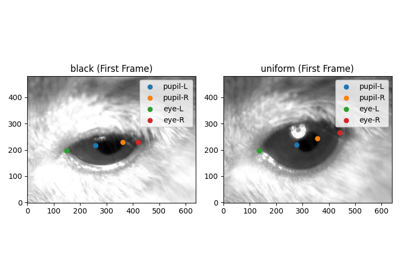compute_pairwise_distances#
- movement.kinematics.compute_pairwise_distances(data, dim, pairs, metric='euclidean', **kwargs)[source]#
Compute pairwise distances between
individualsorkeypoints.This function computes the distances between pairs of
individuals(i.e. interindividual distances) or pairs ofkeypoints(i.e. interkeypoint distances), as determined bydim. The distances are computed for the givenpairsusing the specifiedmetric.- Parameters:
data (xarray.DataArray) – The input data containing position information, with
time,space(in Cartesian coordinates), andindividualsorkeypoints(as specified bydim) as required dimensions.dim (Literal["individuals", "keypoints"]) – The dimension to compute the distances for. Must be either
'individuals'or'keypoints'.pairs (dict[str, str | list[str]] or 'all') –
Specifies the pairs of elements (either individuals or keypoints) for which to compute distances, depending on the value of
dim.If
dim='individuals',pairsshould be a dictionary where each key is an individual name, and each value is also an individual name or a list of such names to compute distances with.If
dim='keypoints',pairsshould be a dictionary where each key is a keypoint name, and each value is also keypoint name or a list of such names to compute distances with.Alternatively, use the special keyword
'all'to compute distances for all possible pairs of individuals or keypoints (depending ondim).
metric (str, optional) – The distance metric to use. Must be one of the options supported by
scipy.spatial.distance.cdist(), e.g.'cityblock','euclidean', etc. Defaults to'euclidean'.**kwargs (dict) – Additional keyword arguments to pass to
scipy.spatial.distance.cdist().
- Returns:
The computed pairwise distances. If a single pair is specified in
pairs, returns anxarray.DataArray. If multiple pairs are specified, returns a dictionary where each key is a string representing the pair (e.g.,'dist_ind1_ind2'or'dist_key1_key2') and each value is anxarray.DataArraycontaining the computed distances for that pair.- Return type:
- Raises:
ValueError – If
dimis not one of'individuals'or'keypoints'; ifpairsis not a dictionary or'all'; or if there are no pairs indatato compute distances for.
Examples
Compute the Euclidean distance (default) between
ind1andind2(i.e. interindividual distance), for all possible pairs of keypoints.>>> position = xr.DataArray( ... np.arange(36).reshape(2, 3, 3, 2), ... coords={ ... "time": np.arange(2), ... "individuals": ["ind1", "ind2", "ind3"], ... "keypoints": ["key1", "key2", "key3"], ... "space": ["x", "y"], ... }, ... dims=["time", "individuals", "keypoints", "space"], ... ) >>> dist_ind1_ind2 = compute_pairwise_distances( ... position, "individuals", {"ind1": "ind2"} ... ) >>> dist_ind1_ind2 <xarray.DataArray (time: 2, ind1: 3, ind2: 3)> Size: 144B 8.485 11.31 14.14 5.657 8.485 11.31 ... 5.657 8.485 11.31 2.828 5.657 8.485 Coordinates: * time (time) int64 16B 0 1 * ind1 (ind1) <U4 48B 'key1' 'key2' 'key3' * ind2 (ind2) <U4 48B 'key1' 'key2' 'key3'
The resulting
dist_ind1_ind2is a DataArray containing the computed distances betweenind1andind2for all keypoints at each time point.To obtain the distances between
key1ofind1andkey2ofind2:>>> dist_ind1_ind2.sel(ind1="key1", ind2="key2")
Compute the Euclidean distance (default) between
key1andkey2(i.e. interkeypoint distance), for all possible pairs of individuals.>>> dist_key1_key2 = compute_pairwise_distances( ... position, "keypoints", {"key1": "key2"} ... ) >>> dist_key1_key2 <xarray.DataArray (time: 2, key1: 3, key2: 3)> Size: 144B 2.828 11.31 19.8 5.657 2.828 11.31 14.14 ... 2.828 11.31 14.14 5.657 2.828 Coordinates: * time (time) int64 16B 0 1 * key1 (key1) <U4 48B 'ind1' 'ind2' 'ind3' * key2 (key2) <U4 48B 'ind1' 'ind2' 'ind3'
The resulting
dist_key1_key2is a DataArray containing the computed distances betweenkey1andkey2for all individuals at each time point.To obtain the distances between
key1andkey2withinind1:>>> dist_key1_key2.sel(key1="ind1", key2="ind1")
To obtain the distances between
key1ofind1andkey2ofind2:>>> dist_key1_key2.sel(key1="ind1", key2="ind2")
Compute the city block or Manhattan distance for multiple pairs of keypoints using
position:>>> key_dists = compute_pairwise_distances( ... position, ... "keypoints", ... {"key1": "key2", "key3": ["key1", "key2"]}, ... metric="cityblock", ... ) >>> key_dists.keys() dict_keys(['dist_key1_key2', 'dist_key3_key1', 'dist_key3_key2'])
As multiple pairs of keypoints are specified, the resulting
key_distsis a dictionary containing the DataArrays of computed distances for each pair of keypoints.Compute the city block or Manhattan distance for all possible pairs of individuals using
position:>>> ind_dists = compute_pairwise_distances( ... position, ... "individuals", ... "all", ... metric="cityblock", ... ) >>> ind_dists.keys() dict_keys(['dist_ind1_ind2', 'dist_ind1_ind3', 'dist_ind2_ind3'])
See also
scipy.spatial.distance.cdistThe underlying function used.
